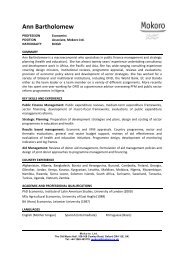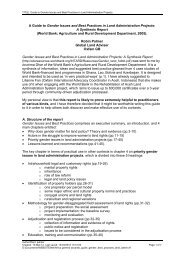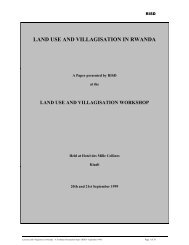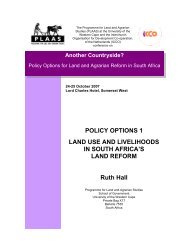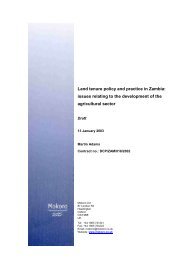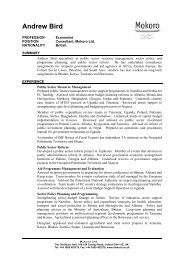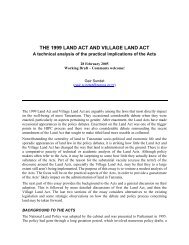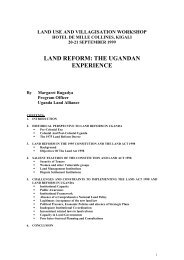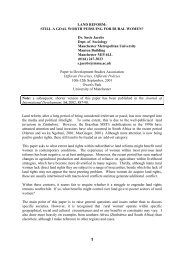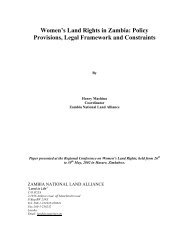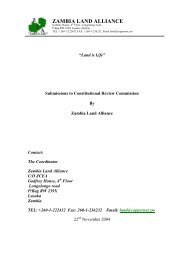Malawi National Land Policy - Mokoro
Malawi National Land Policy - Mokoro
Malawi National Land Policy - Mokoro
Create successful ePaper yourself
Turn your PDF publications into a flip-book with our unique Google optimized e-Paper software.
Ministry of <strong>Land</strong>s Page 8<br />
3. Other land sector policy reforms enacted since 1994 to encourage agriculture, forestry,<br />
tourism, mining and natural resource management and habitat preservation are also<br />
recognized and affirmed by this policy.<br />
This land policy has been prepared carefully and in a balanced way to remove most of the pressing<br />
problems that has created tenure insecurity and undermined speedy and transparent land transactions in<br />
<strong>Malawi</strong>. In many cases, the inadequacies of existing laws, delays in land administration, arbitrary<br />
applications of the public interest criteria, constraining inheritance laws and uncertainty regarding the<br />
strategies for dealing with land pressure have all operated to discourage needed investments and the<br />
nations ability to eliminate poverty and pursue social harmony.<br />
Fundamental measures and processes contained in this <strong>National</strong> <strong>Land</strong> <strong>Policy</strong> will equip <strong>Malawi</strong> to<br />
minimize, if not eliminate the most constraining land problems and bring progress and prosperity to all.<br />
1.1 Background<br />
1.0 INTRODUCTION<br />
1.1.1 In <strong>Malawi</strong>, as elsewhere in the world, land policy reflect the imperative of changing<br />
economic, political, social circumstances. The country has endured a history of continuously<br />
reconstituted clusters of traditions, colonialism, rules, expectations and conflicts, which gave<br />
rise to changing land regulations and practice. The principles and guidelines set out in this<br />
<strong>National</strong> <strong>Land</strong> <strong>Policy</strong> together with legislation to be enacted in support, will give substance to<br />
<strong>Malawi</strong>’s quest for a comprehensive land law with immense economic and social significance.<br />
The policy also provides a sound institutional framework for democratizing the management of<br />
land and introduces much needed procedures for protecting land tenure rights, land-based<br />
investments and management of development at all levels.<br />
1.1.2. <strong>Policy</strong> planning is a conscious effort on the part of policy-makers to achieve, via<br />
appropriate policy instruments, both national goals and specific targets for resource allocation.<br />
In that sense, this national land policy, presented in the form of a coherent socio-economic<br />
policy framework, should legitimately be viewed as seeking a mechanism to promote optimum<br />
utilization of <strong>Malawi</strong>’s land resources for development.<br />
1.1.3. <strong>Malawi</strong> has operated without a comprehensive policy on land matters for a long time.<br />
The present system is a product of colonial history and settlement patterns, policies of the one<br />
party era and recent demographic trends. All these events to some extent contributed to the<br />
problems that affect land tenure and land utilization today. The right to own land must be<br />
respected, but land problems extend beyond individual tenure rights. They involve issues on<br />
rural and urban land management, community development, and the advancement of<br />
agriculture and protection of the environment.<br />
1.1.4. In order to address these land-related social welfare problems, land reform should be<br />
dealt with fundamentally and comprehensively. Nevertheless, this has to be done in a way that<br />
will not compromise the expectation of the market or ignore the realities of resource<br />
constraints. Another vital part of the development process in <strong>Malawi</strong> is empowering individual<br />
citizens and communities to take active interest in their affairs. <strong>Land</strong> policy serves as a<br />
powerful symbol and focus for that local development effort. It provides a mechanism for<br />
reconciling widely differing attitudes towards <strong>Malawi</strong>’s development challenges.<br />
http://www.malawi.gov.mw/lands/landpol.htm 29/03/2005 15:23:13



